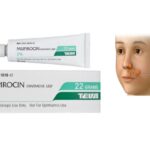Can I Use Mupirocin On My Private Area?

What is mupirocin topical?
Mupirocin is an antibiotic that prevents bacteria from growing on your skin. Mupirocin topical (for use on the skin) is used to treat skin infections such as impetigo or a “Staph” infection of the skin. Mupirocin topical ointment is available as the brand-name drug Centany.
How it works
Mupirocin belongs to a class of drugs called topical antibacterials. A class of drugs is a group of medications that work in a similar way. These drugs are often used to treat similar conditions.
Mupirocin works to kill the bacteria that are causing your infection. These include strains of Staphylococcus aureus and Streptococcus pyogenes. Mupirocin stops the bacteria from multiplying.
How it is used
It is very important that you use this medicine only as directed by your doctor. Do not use more of it, do not use it more often, and do not use it for a longer time than your doctor ordered. To do so may cause unwanted side effects or skin irritation.
This medicine should only be used on the skin. Do not get it in your eyes, nose, mouth, or vagina. Do not use it on skin areas that have cuts, scrapes, or burns. If it does get on these areas, rinse it off right away with water.
To help clear up your skin infection completely, keep using mupirocin for the full time of treatment, even if your symptoms have disappeared. Do not miss any doses.
To use:
- Wash your hands with soap and water before and after using this medicine.
- Apply a thin layer to the affected area of the skin. Rub it in gently.
- After applying this medicine, the treated area may be covered with a gauze dressing if desired.
The dose of this medicine will be different for different patients. Follow your doctor’s orders or the directions on the label. The following information includes only the average doses of this medicine. If your dose is different, do not change it unless your doctor tells you to do so.
The amount of medicine that you take depends on the strength of the medicine. Also, the number of doses you take each day, the time allowed between doses, and the length of time you take the medicine depend on the medical problem for which you are using the medicine.
- For topical dosage form (cream):
- For treatment of secondarily infected traumatic skin lesions:
- Adults and children 3 months of age and older—Apply three times a day for 10 days.
- Children younger than 3 months of age—Use and dose must be determined by your doctor.
- For treatment of secondarily infected traumatic skin lesions:
- For topical dosage form (ointment):
- For treatment of impetigo:
- Adults and children 2 months of age and older—Apply three times a day.
- Children younger than 2 months of age—Use and dose must be determined by your doctor.
- For treatment of impetigo:
Can you use mupirocin ointment for vaginal itching?
No, you should avoid putting mupirocin ointment in your private area including your vagina because it can kill the good bacteria that protect people from fungal infections and upset the natural balance of the body’s natural flora. This imbalance may lead to a fungal (candida) infection of the mouth, digestive tract, or vagina. It can also cause burning at the application site. Women suffering from vaginal itching can apply a mild (low-strength) corticosteroid cream such as hydrocortisone to the genital area to provide temporary relief. The cream should not be put into the vagina and should be used for only a short period of time.
For severe itching, an antihistamine taken by mouth may help temporarily. Antihistamines also cause drowsiness and may be useful if symptoms interfere with sleep. Lichen sclerosus is treated with a cream or an ointment containing a high-strength corticosteroid (such as clobetasol), available by prescription.
What Are Side Effects of Mupirocin Cream?
Common side effects of mupirocin cream include:
• headache,
• rash,
• nausea,
• abdominal pain,
• burning at the application site,
• severe bacterial skin infection (cellulitis),
• skin inflammation or rash,
• dizziness,
• itching,
• secondary wound infection, and
• mouth sores.
Tell your doctor if you have serious side effects of mupirocin cream including:
• severe allergic reactions (hives, trouble breathing, wheezing, swelling of your face/lips/mouth/tongue, dizziness, fast heartbeat or pounding in your chest, rash over your whole body),
• eye irritation,
• irritation in the area mupirocin cream is used, or
• a type of diarrhea called clostridium difficile-associated diarrhea (CDAD).





